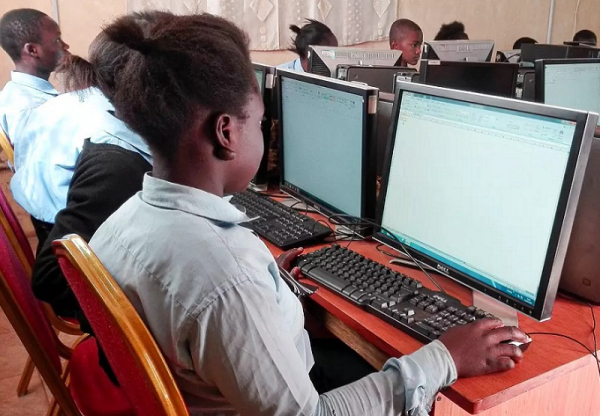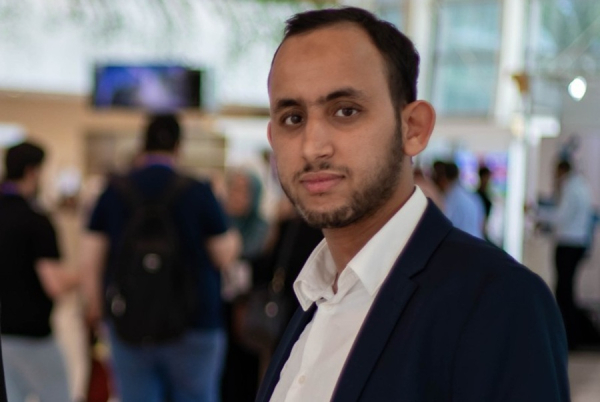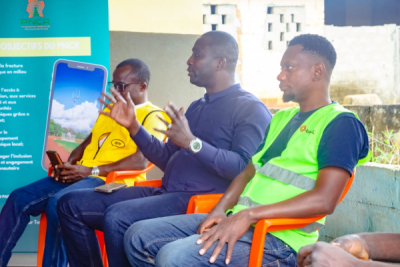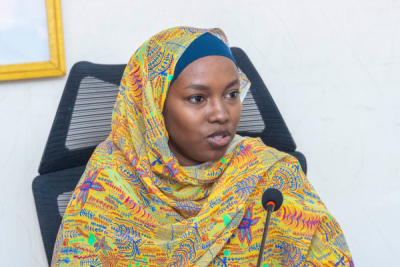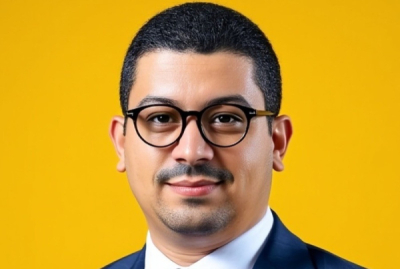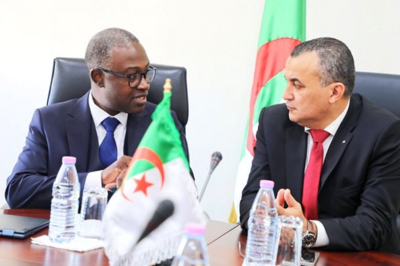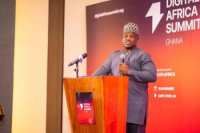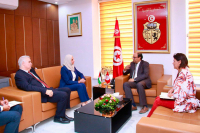- Burkina Faso advances digital education through PACTDIGITAL initiative
- Plans include online platform, updated curricula, ICT equipment in schools
- Challenges remain: poor connectivity, limited training, equipment shortages
Burkina Faso is pushing forward with the integration of digital technology into its education system. The Digital Transformation Acceleration Project (PACTDIGITAL), led by the Ministry of Digital Economy, outlined its support for the Ministry of Secondary Education and Technical and Vocational Training on Wednesday, September 10.
The project's key initiatives include updating telecommunications and ICT curricula to better align with job market demands, launching an online learning platform, strengthening local skills in creating educational multimedia content, and providing digital equipment to scientific high schools in Ouagadougou and Bobo-Dioulasso.
According to Haoua Ouattara/Dama, the project coordinator, these actions aim to digitize core ministerial processes, modernize teaching practices, and pave the way for new digital-related careers. Boubacar Savadogo, the Minister of Secondary Education, stated that the support will help improve the quality of training and increase the number of skilled digital professionals.
The initiative is part of the Burkinabè government's broader digital transformation goals, which aim to leverage technology for key sectors, including education. For example, a project to develop 95 educational mobile applications was announced in February 2024. UNESCO believes that digital learning has the potential to expand access to education, improve learning outcomes, and equip students with the knowledge and skills needed to tackle 21st-century challenges.
However, the integration of ICT into Burkina Faso's education system faces several obstacles. A 2023 government assessment highlighted structural and technical challenges, including insufficient coordination among different stakeholders, a lack of widespread public awareness, and limited and expensive internet connectivity. The report also pointed to issues with cloud service functionality, low fiber optic coverage in educational institutions, a lack of adequate training, and a shortage of computer equipment and logistical materials.
Isaac K. Kassouwi
• Omar Zergoun co-founded Yalitec, a logistics startup for online merchants.
• Platform offers express delivery across 58 wilayas with real-time tracking.
• Services include multi-carrier shipping, automated labels, and fast payments.
Omar Zergoun, an Algerian tech entrepreneur, is the co-founder and CEO of Yalitec, a startup providing logistics and shipping solutions tailored to e-commerce businesses.
Founded in 2020, Yalitec has developed a full technology platform that helps companies optimize the management and tracking of their deliveries. The firm offers express delivery for online merchants to consumers in more than 58 wilayas, supported by real-time tracking through a dedicated web app.
The startup’s integrated system enables merchants to ship with multiple carriers simultaneously, generate shipping labels automatically, and benefit from flexible billing with accelerated payment collection. “Shipping should not be a nightmare. With Yalitec, you get first-class courier services both locally and internationally, along with a dashboard to monitor, manage, and grow your online business,” the company said.
Zergoun graduated from Badji Mokhtar University of Annaba in 2017 with a degree in marketing and later earned a master’s in service marketing from the University of Algiers 3 in 2020.
He began his career in 2019 as a commercial marketing manager at Gbatis, an Algerian construction company. He later joined Process House, a consulting and training firm, where he worked as a graphic designer between 2019 and 2021 before fully focusing on Yalitec.
• Rural connectivity program targets 30 new localities under PNCR Phase II.
• Goal is to cut digital divide and expand access to education, health, and trade.
• Internet penetration remains 52.7% in urban areas vs 24.6% in rural zones.
Côte d’Ivoire’s Ministry of Digital Transition and Digitalization is leading the second phase of the National Rural Connectivity Program (PNCR) through September 25, 2025, with support from the country’s telecom regulator ARTCI. This stage aims to connect 30 additional localities to high-speed internet. The rollout began in the Worodougou region, where the villages of Yanfissa, Kangana, Kognimansso, and Dougbe are already online.
Next in line are the regions of Kabadougou, Grands-Ponts, Nawa, Sud-Comoé, Nzi, Guémon, Cavally, Poro, and Tchologo. The project seeks to narrow the digital divide between urban and rural areas, making it easier for communities to access education, healthcare, commerce, and financial services.
“Rural connectivity is central to President Alassane Ouattara’s vision of social and digital transformation. He sees technology and innovation as key drivers of economic and social development,” said Minister Kalil Konaté. “This program ensures that every citizen, regardless of where they live, has easy access to high-speed internet and digital services.”
The PNCR is part of broader government efforts to position Côte d’Ivoire as a regional digital hub. According to ITU DataHub, internet penetration in the country is 52.7% in urban areas, compared with just 24.6% in rural zones. Household access to home internet shows a similar gap: 85.7% in cities versus 57.7% in the countryside.
Ultimately, the program is expected to reduce the urban-rural gap in connectivity, strengthen digital inclusion, and boost local economic development in previously underserved areas. It could also support entrepreneurship, improve access to e-government services, and better prepare rural populations to integrate into the national digital economy.
• Chad plans integrated digital platform for licenses, permits, and vehicle papers.
• Project seeks to cut costs, improve traceability, and reduce delays for users.
• Country ranks 189th out of 193 on UN’s 2024 E-Government Development Index.
Chad is preparing to modernize its transport-related administrative services through an integrated digital system. The initiative was discussed on September 9 during a meeting chaired by Transport Minister Fatima Goukouni Weddeye, focused on digitizing financial services within her department.
The project aims to centralize all services offered by the ministry into a single platform. These include the issuance of vehicle registration cards, driver’s licenses, technical inspection certificates, transport licenses and permits, and the mandatory consignment note (LVO). The goal is to make services more accessible, ensure traceability, and reduce both processing times and costs for users and businesses.
This plan aligns with a broader national push to modernize public administration and digitize government services. Chad has already taken steps such as partially digitizing administrative procedures and creating online platforms to track official documents.
However, the country still lags in digital governance. According to the United Nations, Chad scored 0.1785 out of 1 on the 2024 E-Government Development Index, ranking 189th out of 193 countries. This underlines the urgent need to accelerate digital transformation to make public services more effective, reliable, and accessible.
The rollout of an integrated digital system could address key challenges. It would simplify administrative processes, cut costs, reduce fraud and document loss, and strengthen efficiency in the transport sector. In the long term, it is expected to boost competitiveness, improve access to services for citizens, and reinforce transparency in public operations.
A specialist in document intelligence and digital transformation, he is helping drive a major shift in Morocco. As co-founder of Harmony Technology, he develops tools to automate and secure how public and private institutions manage their documents and data.
Mohammed Baaddi, a Moroccan expert in document intelligence and digital transformation, is the co-founder and CEO of Harmony Technology, a company that develops solutions for public institutions, large corporations, and industrial players.
Founded in Rabat in 2018, Harmony Technology creates tools that integrate document intelligence with artificial intelligence and the Internet of Things. The company specializes in the academic sector, serving libraries, universities, museums, and research centers. Its services include knowledge management, document digitalization, automation, and digital preservation.
In 2024, Harmony Technology formed a strategic partnership with Maritemex, an international cybersecurity firm. This collaboration aims to enhance cybersecurity and digital resilience in Morocco and the wider region by combining the expertise of both companies.
Baaddi holds an engineering degree in computer science from the École supérieure d’ingénierie en sciences appliquées, earned in 2008. He also received a master’s degree in information systems technology from France’s Mines-Télécom Atlantique in 2010.
He began his professional career in 2008 as a research and development engineer at Casanet, a Moroccan IT company. From 2010 to 2017, he worked at Naseej, a technology company, where he served as a technical support manager before becoming a key account manager.
Melchior Koba
-
Algeria to sign digital cooperation deal focused on youth
-
Plan includes digital hubs, innovation programs, and training
-
Part of 2030 strategy for inclusion and digital transformation
Algeria's Ministry of Post and Telecommunications and Ministry of Youth will soon sign a framework agreement to strengthen cooperation, officials announced following a meeting on Wednesday, September 10. The accord aims to place youth at the heart of the country's national digital strategy.
The new agreement is expected to lead to the creation of dedicated digital spaces for young people, provide better support for the digital transition, and increase their participation in the country's modernization efforts. It is designed to stimulate innovation, encourage entrepreneurship, and reinforce the role of youth as key players in national digital development.
The announcement was made after a meeting between Minister of Post and Telecommunications Sid Ali Zerrouki and Minister of Youth Mustapha Hidaoui. Their discussions focused on developing programs to enhance youth skills, creativity, and innovation. The two ministers stressed the importance of concrete projects that combine the digital and technological expertise of the telecommunications sector with the initiatives of youth centers.
This collaboration is part of Algeria’s 2030 National Digital Transformation Strategy, which prioritizes human capital and digital inclusion. The government has already launched several initiatives, including incubators and training programs, to support young entrepreneurs and develop startups. Authorities now aim to extend this momentum to youth facilities, transforming them into hubs for inclusion and innovation.
Samira Njoya
-
GSMA projects digital transformation could create $3.4 bln and 500,000 jobs
- Agriculture, industry, trade, transport, and public administration flagged as key sectors
-
National digital strategies aim to boost tax revenue, efficiency, and competitiveness
Ghana’s economy could gain more than 40 billion GHS ($3.4 billion) and nearly 500,000 jobs by 2029 through digital transformation, according to the report Driven Digital Transformation of the Economy in Ghana released on September 3 in Accra by the GSMA. The study identifies five strategic sectors—agriculture, industry, trade, transport, and public administration—as crucial drivers for growth and tax revenue.
Agriculture holds the largest potential, with an estimated 10.5 billion GHS and 190,000 jobs from precision farming and mobile extension services. Industry could generate 15 billion GHS and 110,000 jobs through the adoption of cloud, artificial intelligence, and automation, while also providing 2.6 billion GHS in extra tax revenue.
The modernization of public administration, especially tax collection, could add 5.8 billion GHS by reducing leakages and improving efficiency. E-commerce and digital platforms are projected to contribute 5.1 billion GHS and 60,000 jobs, while digitalization in transport and logistics could add 4.3 billion GHS and 80,000 jobs.
These prospects build on measures already launched by the government. This year Ghana rolled out the RESET program, a national framework for building a “digitally inclusive, data-driven economy.” Key actions include scrapping the electronic transfer levy, launching the One Million Coders initiative to train young developers, and preparing a national digital strategy. A national artificial intelligence strategy is expected in the coming days.
The mobile industry, already a major economic driver, accounts for 8% of GDP, or 94 billion GHS. Despite 99% 4G coverage, only 62% of capacity is in use. With solid infrastructure, Ghana is well-positioned to scale up its digital transformation, supported by mobile money and affordable Internet access, which costs about 1.5% of per capita income.
Challenges remain. The mobile market is highly concentrated, with MTN holding over 75% of subscribers, which limits competition and innovation. Expanding rural infrastructure, updating spectrum management and the Universal Service Fund, and clarifying regulatory frameworks will be vital to attract sustainable private investment. According to GSMA, Ghana’s ability to reach the 40 billion GHS target will depend on balancing access, boosting competition, and fully integrating strategic sectors into the digital economy.
This move mirrors global trends: many countries (from the U.S. to Kenya and Nigeria) are adopting policies to tax the digital economy, ensuring fairness between traditional businesses and online players.
The Ghana Revenue Authority (GRA) has unveiled comprehensive systems to monitor the earnings of bloggers, content creators, and creative professionals, emphasizing that all income earners—formal or informal—are required to meet their tax obligations.
Speaking at Joy FM’s 7th Showbiz Roundtable in Accra on September 6, Isaac Kobina Amoako, Chief Revenue Officer and Head of the GRA’s IT Training Centre, explained that the authority now applies the same tracking mechanisms used for traditional income earners to the digital and creative sectors.
“The same way we track all income earners is the same way we track the income of creatives,” Amoako told participants at the event, themed “GRA vs. Creatives – Taxation and the Future of Ghana’s Creative & Digital Economy.”
According to the GRA, its monitoring framework includes informant networks, third-party reporting, and surveillance of banking transactions. For creators who operate outside traditional banking channels, payments can be tracked through intermediaries handling financial flows on their behalf.
Alongside the compliance measures, the authority announced new incentives for young entrepreneurs in the sector. Victor Yao Akogo, Chief Revenue Officer at the Domestic Tax Division, revealed that creative businesses owned by individuals under 35 will benefit from a five-year tax holiday. In addition, modified rules introduced in September 2025 exempt some creatives from mandatory Value Added Tax (VAT) registration, easing the burden on smaller or informal operators.
The forum, which convened musicians, filmmakers, DJs, bloggers, event organizers, fashion designers, and comedians, explored how taxation is shaping Ghana’s fast-growing creative and digital economy. Speakers included Kojo Poku of the Event and Meeting Professionals Association of Ghana and Francis Doku, CEO of Maestro Africa Group.
The GRA’s broader strategy is to ensure that modern revenue streams—ranging from advertising and sponsorship deals to content platform earnings—are captured within the national tax net. Industry figures also called for closer collaboration. Playwright and Globe Productions CEO Latif Abubakar stressed the importance of partnership between tax authorities and creatives, noting the sector’s potential to significantly boost Ghana’s GDP if properly formalized.
The announcement comes as Ghana seeks to formalize its digital economy and capture revenue from online activities that are rapidly becoming mainstream sources of income. The GRA’s dual approach—tightening monitoring while offering incentives—reflects an effort to balance compliance with support for the growth of the creative sector.
The creative economy is often difficult to tax because much of the revenue comes from diverse sources like influencer sponsorships, YouTube ad revenue, DJ gigs, event organizing, or cross-border payments. The GRA’s new monitoring mechanisms show the government is moving to close revenue leakages and capture funds that might otherwise slip through the cracks.
For content creators, the message is clear: digital earnings are subject to the same obligations as traditional income. Ghana’s tax-to-GDP ratio, at 13.8% in 2022, remains well below the government’s target of 18–20% by 2027. This gap highlights why the GRA is intensifying efforts to bring informal and digital sectors into the tax net. By focusing on bloggers, influencers, and digital creators, the GRA is not just chasing compliance—it is attempting to widen the tax base in line with national fiscal goals. The combination of monitoring systems and youth-focused incentives suggests an effort to strike a balance: ensuring revenue collection while encouraging entrepreneurship and growth in the creative economy.
If successful, this approach could both boost state revenue and help formalize Ghana’s digital creative sector, making it a more stable contributor to economic growth.
Hikmatu Bilali
-
Adrian Hope-Bailie co-founded fintech firm Fynbos Money in 2021
-
Company aims to help 1 mln young South Africans open tax-free savings accounts
-
Platform uses Interledger and Open Payments standards for seamless digital finance
South African digital payments specialist Adrian Hope-Bailie is the co-founder and CEO of Fynbos Money, a fintech company launched in 2021.
Fynbos Money is building a savings and investment platform designed to give individuals simple and secure access to modern financial services. Its mission is to “help one million young South Africans open tax-free savings accounts (TFSA) as a first step into investing.”
The company relies on the Interledger protocol to power a universal payment solution integrated into its digital wallet. This wallet, developed under Open Payments standards, links multiple accounts and financial identities in one place, allowing users to manage funds, save regularly, and invest more easily.
Hope-Bailie graduated with a degree in information systems from the University of Cape Town in 2005. He began his career as a developer in several South African companies.
In 2008, he joined Ireland-based dotMobi as a senior engineer, then became head of professional services in Africa at S1 Corporation the following year. In 2012, he moved to U.S. fintech ACI Worldwide as services lead for Africa before joining Paycorp Holdings as a product development specialist.
In 2013, he became head of product development at Sanchion Payment Solutions. Between 2018 and 2021, he worked at U.S. company Coil as head of Interledger and services, where he played a key role in developing the Interledger protocol and Open Payments standards.
-
Officials meet in Tunis to explore cooperation in digital technology and postal sector
-
Talks focus on training, technical expertise, and start-up collaboration
-
Tunisia ranks 9th in Africa on ICT index, while Palestine seeks to bridge digital gap
Tunisia and Palestine have reaffirmed their interest in strengthening cooperation in information and communication technologies (ICT) and in the postal sector. The commitment was made during a meeting on September 9 in Tunis between Sofiene Hemissi, Tunisia’s Minister of Communication Technologies, and Houda Wahidi, Palestine’s Deputy Minister of Telecommunications and Digital Economy, in the presence of Palestinian Ambassador Rami Qaddoumi.
Talks centered on deepening bilateral ties through training, knowledge sharing, and technical expertise. Both sides also expressed interest in fostering collaboration between Tunisian and Palestinian start-ups to drive innovation and enhance the competitiveness of their digital ecosystems.
The initiative aligns with both countries’ vision of consolidating their digital sectors as a way to diversify their economies. Tunisia is already well positioned, ranking 9th in Africa with an ICT Development Index score of 79.6 out of 100, according to the International Telecommunication Union’s July 2025 report. Palestine, constrained by structural challenges, scored 69.1, signaling room for convergence.
A partnership could deliver multiple benefits. For Palestine, it could expand digital access in schools, government services, and rural areas, helping reduce the digital divide. For Tunisia, the cooperation would create opportunities to export its technological know-how, open markets in the Middle East, and strengthen its start-up ecosystem by exposing it to new and demanding environments.
The talks remain at a preliminary stage. While general directions have been outlined, specific terms have not yet been agreed, and no formal deal has been signed so far.
More...
-
Craig Newborn co-founded PayJustNow, a South African buy-now-pay-later platform
-
Service lets shoppers split payments with no fees, plus access deals and loans
-
Platform aims to boost consumer access while helping retailers lift sales
South African fintech entrepreneur Craig Newborn is one of the founders of PayJustNow, a company offering buy-now-pay-later (BNPL) solutions for retail consumers.
Launched in 2019, PayJustNow allows shoppers to make purchases immediately and pay in installments without extra charges. The service is designed to protect consumer purchasing power in an environment of rising inflation and interest rates, while reducing over-indebtedness risks.
The platform also features a “Deals” function, giving users direct access to promotions from their accounts. In addition, it offers personal loans of up to 25,000 rand (about $1,400).
On its LinkedIn page, PayJustNow says it is “changing the face of South Africa’s retail landscape, delivering convenience and accessibility to the consumer, while driving sales and improving customer retention for retailers.”
Newborn earned a degree in electronic and electrical engineering from Stellenbosch University in 2002, the same year he began his career at In2One SA as technical strategy director.
In 2005, he joined Spain-based Global Voice Group as vice president for International Voice and Data Gateway divisions. In 2009, he moved to digital solutions provider Itemate Solutions, first as chief operating officer, later becoming CEO in 2014, a role he held until 2020.\
Melchior Koba
He designs digital projects that transform African narratives into interactive experiences. His work connects game development, culture, and education, while also building local and international collaborations.
Eyram Tawia is a Ghanaian entrepreneur in the video game and digital technology sectors. He is the co-founder and CEO of Leti Arts, a studio specializing in the development of African video games and digital comics.
Founded in 2009, Leti Arts aims to showcase African narratives by creating immersive experiences that reflect the continent's cultural and historical diversity. "We are reviving Africa’s culture and heritage, delving into ancient tales, and sharing them with a modern, enchanting twist," the company said.
Since its inception, Leti Arts has developed several titles, including "Africa’s Legends," a game that immerses players in stories inspired by African mythologies. The studio collaborates with international partners such as Microsoft, Riot Games, and Gameloft to produce interactive content for both entertainment and education, allowing users to learn about and discover African culture through contemporary digital formats.
Tawia also co-founded the Pan Africa Gaming Group in 2022, a pan-African network dedicated to video game creation. He serves on the board of Games for Change Africa, based in South Africa, and is an adjunct lecturer at Ghana's Ashesi University. He chairs the Gamers Association Ghana and leads the country's activities for Ambitious.Africa, an initiative that connects young African innovators with Western partners.
He graduated from the Kwame Nkrumah University of Science and Technology in Kumasi, Ghana, with a bachelor's degree in computer science in 2006. His professional career began in 2003 as a lead programmer at Blacksoft Developers Ghana. From 2022 to 2024, he served as a board member of KuchezaGaming, a video game studio based in Nigeria.
Leti Arts was recognized as the most influential African startup by Fast Company in 2015. Tawia won the World Summit Awards in the culture and tourism category in 2018 and was named an icon of the African video game industry in 2021.
Melchior Koba
Combining advanced technology and public health, she offers an innovative solution to the challenge of infant mortality in sub-Saharan Africa.
Dajora Floderma Mouyombo is a Congolese engineer specializing in industrial robotics and artificial intelligence. She is the founder and CEO of Datechinnova, a technology company focused on telemedicine.
Founded in 2022, Datechinnova develops health-sector solutions, with a particular focus on neonatology in Africa. The company combines robotics and artificial intelligence to improve medical care for newborns, especially premature babies, in low-resource settings. Its core product is a line of smart neonatal incubators.
These incubators provide continuous monitoring of newborns, automatically detecting vital signs and alerting medical staff when needed. The goal is to reduce infant mortality while easing the workload on hospital teams. "We offer hospitals and health centers a reliable, autonomous, and secure solution that improves the care of premature babies while facilitating the work of medical teams," the company said.
In addition to her work at Datechinnova, Mouyombo is an automation specialist for Congolese brewery BRASCO. She also teaches control systems, regulation, instrumentation, and automation at the International 2I Institute in Brazzaville.
She holds a professional bachelor's degree in automation and industrial IT from the Institut Université de la Côte in Douala, Cameroon, earned in 2016. She then earned a bachelor's degree in industrial engineering in 2017 and a master's degree in robotics, industrial vision, and artificial intelligence in 2019, both from the National Advanced Polytechnic School of Douala.
Her professional career began in 2014 as a design specialist at Electronik Programmable in Cameroon. In 2019, she completed an internship at Complexe Multi-Industriel du Cameroun (CMIC SA). The following year, she joined Société Agricole de Raffinage Industries du Sucre du Congo (SARIS Congo) as a control specialist. Between 2020 and 2022, she also worked as an instrumentation engineer at Dangote Industries in Congo.
In 2022, Mouyombo received the second prize for technological innovation from the Republic of Congo's Ministry of Posts, Telecommunications, and Digital Economy as part of the Denis-Sassou-N'Guesso national competition. In 2025, she was selected to represent Datechinnova at the OSIANE Challenge, which showcases the most promising startups in the Congo Basin.
Melchior Koba
By developing technology for online exam proctoring, this solution demonstrates how AI can be a valuable tool for preserving academic integrity.
The Invigilator is an artificial intelligence-powered solution for online exam proctoring. Launched in 2020, it uses AI to automatically detect fraudulent behavior.
The startup recently raised 195 million rand (about $11.1 million) in a funding round led by Kaltroco, a family investment firm based in the Channel Islands. The company plans to use the capital to accelerate its global expansion, enhance its AI models, add multilingual features, and form international partnerships in regions such as North America, Europe, Asia, and the Middle East.
"This investment gives us the ability to ramp up AI development. The creation of our live AI monitoring technology means The Invigilator is moving to constant assessment monitoring through AI," Nicholas Riemer, co-founder of The Invigilator, said.
The Invigilator integrates several technologies, including facial recognition from random selfies compared to a pre-recorded photo, GPS tracking to identify potential collusion when multiple students are in close proximity, intermittent screen capture to detect the use of unauthorized resources, and audio recording to spot suspicious conversations. It also performs anti-plagiarism checks using OCR. Alerts generated by the system are presented on a centralized dashboard for review by instructors, combining automation with human judgment.
Designed for accessibility, the application is compatible with low-end smartphones and modest PCs. It is notable for its low data consumption and ability to function offline, making it an ideal solution for environments with limited connectivity. The Invigilator is available on iOS, Huawei's AppGallery, and Android, where it has been downloaded over 500,000 times, according to data from the Play Store.
Adoni Conrad Quenum


